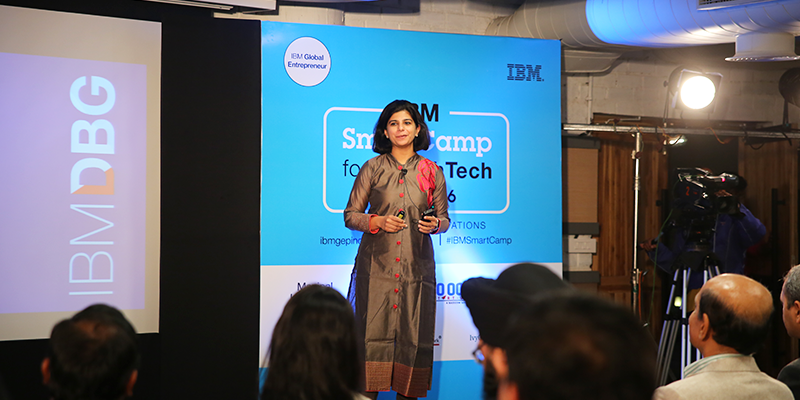India currently has around 3 million developers and has the second largest Android developer community in the world after the US. As per a study from Deloitte, India will have the largest base of developers by 2019. Developers will be drivers of customers’ adoption of cloud and cognitive solutions. About 60% of the developers in India have been experimenting with AI [Artificial Intelligence] and machine learning, compared to 39% in the rest of the world. This shows developers in India are receptive towards AI, Cognitive and data science technologies.

AI, Machine Learning, Cognitive computing, Data analytics, etc. are some of the emerging technology trends and they are now observing widespread adoption. Today, IBM stands at the forefront of a worldwide industry to lead the next phase of change revolutionizing the way in which businesses work and grow. With rapid changes in the technology landscape and open source movement, top-down approach is no longer being followed in organizations and developers are now playing role in the entire technology eco-system. Cloud related technologies are a boon for the developers and the barrier to entry has become limited.
IBM, as a part of the ‘Developer Relations Group‘ works with clients, students, developers, startups amd support them in understanding technology, helping them and get their job done effectively. Seema Kumar leads the IBM Developer Relations group which is a part of the IBM Digital Business group. We had a chat with Seems Kumar about IBM’s eco-system efforts, its involvement with startups, role of Watson in shaping up AI industry, etc. So, let’s get started with the Q&A…
Every organization is involved with top tier institutes, what are some of the steps that IBM Evangelism team is taking in order to connect with the student community in lesser known institutes ?
Every student is important to us, irrespective of whether the student is from IIT/IIM or from colleges that are located in tier-2/tier-3 cities. This is mainly because lot of innovation is happening from universities that do not carry the IIT/IIM tag. Students from these colleges are continually learning and the credit goes to the low barrier to entry. IBM has a developer platform called OnTheHub where any university can enroll, students get IBM Credits and they can also use IBM tools for software development.
In some colleges, we also have some development courses as a part of the curriculum where we train faculty members on Watson, Chatbots, AI, etc. and most of the association is with tier-2 institutes.
What are some of the initiatives that IBM is taking to connect with the startup and the entreprenurial community in India [be it TiE, NASSCOM, etc.] ?
Startup eco-system in India is very vibrant. IBM works directly with startups as well as with other partners. IBM has partnered with TiE, NASSCOM 10000, etc. where in some cases, IBM participates in community events.
In case of NASSCOM 10K, IBM works with startups where we monitor and mentor them. Our programme is called as Global Entrepreneur Programme [GEG], there are different plans namely Standard, Basic and Premium Plan. IBM has been actively involved in mentoring startups across different sectors like EdTech, HealthCare, etc. from technology, business expansion, market readiness, etc. point of view.
More than 200 startups are working with IBM in the technology space. In fact, lot of startups are using Watson API’s for building meaningful apps around Chatbots. For example, a startup that we are mentoring built a chatbot named ValleyBot to identify fake news and they are getting good amount of traction.
There are lot of cloud solutions available in the market, what are some of the major advantages for moving to the IBM cloud [both from the developer as well as enterprise perspective] ?
IBM has various solutions for different audiences. IBM’s cloud offering is a combination of Public, Private and Hybrid cloud. As a matter of fact, lot of apps available in the existing data centers are not cloud ready i.e. Even if they are migrated to the cloud, they cannot capitalize on the benefits of virtualization, effective resource utilization, etc. Cloud solutions from IBM helps you build cloud native applications. Developers are always on the look-out for their own choice of technologies.
IBM Cloud is a Platform As a Service [PAAS] offering that has various API’s for different programming languages. Choice, flexibility to use what developers want and the way they want are some of the key differentiators. Most of the apps of the future would have some sort of cognitive capabilities built into it and Natural Language Processing [NLP], visual recognition features to build conversation interfaces would be some of the basic building blocks to build a cognitive application. These features are available in the Watson APIs and using these APIs, apps are enterprise ready from day one of development!
To summarize, choice of catalogue, breadth of services, flexibility to choose between Public/Private/Hybrid cloud and ability to build secure, cognitive, enterprise ready software on the cloud are some of the inherent advantages.

Can you comment on Chatbots and what are some of the core ingredients of a Chatbot kind of application ?
Context of conversation and Intent are very important ingredients in building a Chatbot and hence, training & design of the oervall interface are very important factors when building a Chatbot. Watson APIs are very powerful and are specifically designed by keeping these important factors in mind. With every interaction, learning happens and it gets better with more data.
There is buzz about Blockchain, what according to you are some of the ideal use-cases where Blockchain might be useful for a ‘Digitally Growing’ like India ?
Blockchain as a technology is constantly evolving and it is definitely here to stay. Blockchain offers powerful Usecases for any usecase that involves multiple parties and multiple transactions. In a nutshell, it is nothing but a distributed ledger. Initial usecases have obvisouly evolved in the Finance sector but Blockchain would be relevant in other sectors as well.
Blockchain when used in conjunction with IoT, lot of powerful usecases would eveolve. For example, IBM recently worked with the Mahindra Group to build a Blockchain solution for supply chain finance across India. This solution improved the transparency of overall operations. IBM also announced a Trade Finance platform using the IBM Blockchain platform that can be used by banks. Blockchain can also be extended across other sectors like Healthcare, Insurance, etc.
Your comments on Digital India and how IBM’s involvement in the overall journey ?
There is definitely a robust infrastructure in place with Aadhar API’s, eKYC, India Stack, UPI, etc. have led to a huge thrust in digital payments in India. As far as IBM is concerned, we work closely with iSpirt where we also participate as an eco-system partner.
India is a country with rich amount of data and this is where the aspect of Data Science becomes very critical as we need to draw valuable insights from the data. IBM has also tied-up with NASSCOM and Government Of Karnataka to build Center Of Excellence [COE] in Data Science where IBM will be the core technology partner. IBM will not only groom talent in data science but will also work on Proof Of Concept [POC] and support startups in that category.
What are some of the certifications that a student/professional can opt for, in order to gain expertise/know-how in Cognitive Computing, Machine Learning, Cloud Computing, IBM BlueMix, etc. ?
IBM has partnered with an EdTech partner where we launched Cognitive Class previously called as Big Data University. IBM has also tied-up with JigSaw Academy where they use IBM’s Big data expertise for all their courses. In the area of certification, IBM has partnered with Global Knowledge that offers on Cloud computing, DevOps, AI, etc.
There has been lot of scepticism that AI, Robotics & other ‘Automation/Machine related technologies’ would wipe off many jobs in future, what are your thoughts on the same and how can AI [and other technologies] go hand-in-hand with human jobs ?
Ginni Rometty, IBM CEO believes in three principles that are applicable in the cognitive era – Purpose, Transparency and Skills. The purpose of a cognitive app is to augment human intelligence and not to replace humans. Products and Services from IBM are built with this principle in mind and human intelligence is a key aspect.
IBM is helping human beings being more productive, realize their potential and focus on more important jobs rather than working on mundane & repetitive jobs. You must be clear as you build AI platforms how they are trained, and what data was used in training. When we talk about transparency, IBM has always been cognizant of data. AI platforms must be built with people in the industry and companies must prepare to train human workers on how to use these tools to their advantage.
We thank Seema Kumar for sharing her insights with our readers and walking us through the awesome work done by IBM for shaping up the developer ecosystem. If you have any questions for Seema about Watson, Chatbots, how solutions from IBM can accelerate your development, etc. please share them via a comment to this article.

